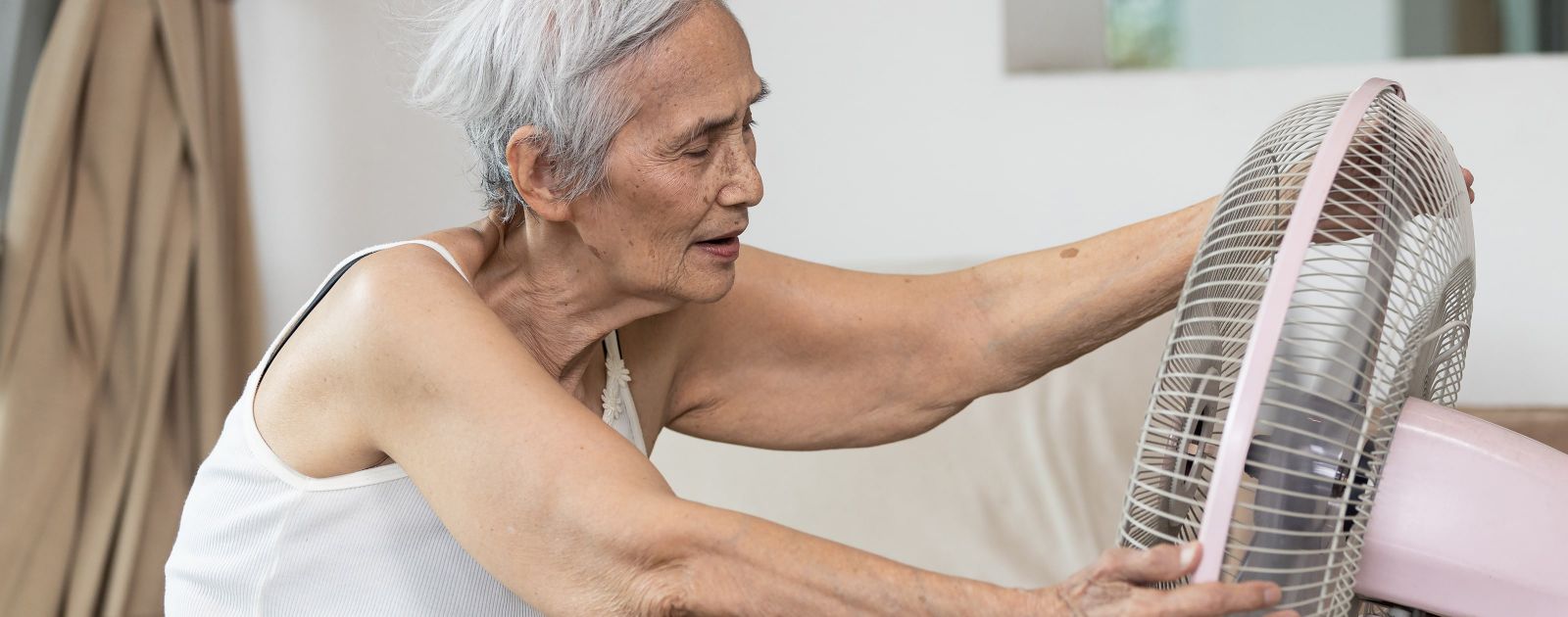
Tips for staying healthy in the heat
Author: Christine Farmery
Whilst the warmer weather that summer brings is welcome for many, higher temperatures can pose serious health risks, particularly to the more vulnerable like older people and small children. According to the NHS, there are on average 2000 heat-related deaths in England every year, so when a heatwave is forecast it’s important to be prepared so that you and your loved ones stay safe in the hot weather.
Stay hydrated
Not drinking enough water and becoming dehydrated is one of the most common heat-related health risks.
The NHS recommends drinking at least 1.2 litres of water per day (six to eight glasses), but this needs to be more in hot weather. The easiest way to check your hydration levels is by the colour of your urine – pale is good, but dark signifies that you’re dehydrated.
Drink plenty of water even if you do not feel thirsty. Drinking little and often throughout the day is the most effective technique for staying hydrated.
Avoid alcoholic and sugary drinks which can make dehydration worse as well as foods that are high in salt. Foods that are high in fluid like strawberries, oranges, cucumber, and watermelon are tasty options towards staying hydrated.
Keep cool
Overheating can not only become very uncomfortable, but it can also lead to heat exhaustion and heatstroke. In most cases, overheating is easily avoided and reversed if you take precautions to stay cool when the temperature heats up.
Spend time inside and keep your house cool by closing curtains in rooms that face the sun. Take cool baths or showers to keep your body temperature regulated.
It may be tempting to get out and make the most of the great weather but choose your timings and activities wisely so that you don’t overheat. If you’re spending time outside, seek out shade, or take shade with you if you’re going somewhere exposed like the beach. Wear a hat and light loose-fitting clothes, take water with you, apply sun cream regularly, don’t do anything too strenuous in the heat, and try to keep out of the sun in the middle of the day.
Make use of that air con when you’re travelling in the car and never leave anyone in a closed, parked vehicle – especially older people, children, or animals.
Look after each other
Older people are particularly vulnerable in a heat wave, especially if they live alone or have existing health conditions.
Older adults are more susceptible to heat-related illnesses because of age, other health issues, and medications they may take.
Make sure to check in with your loved ones to see how they’re coping with the heat and look out for those who may struggle to keep themselves cool and hydrated.
Visit or phone elderly friends, neighbours, and relatives, every day. Offer to do their shopping for them if it’s too hot for them to go out and encourage them to drink lots of water and keep themselves cool.
Look out for heat-related symptoms
If you or someone else feels unwell during hot weather, it may be heat exhaustion or heatstroke.
Heat exhaustion is not usually serious if you can cool down within half an hour but if it turns into heatstroke, it needs to be treated as an emergency.
The signs of heat exhaustion include headaches, dizziness, nausea, excessive sweating, thirst, fast breathing, or a high temperature of 38C or above.
If someone is showing signs of heat exhaustion, cool them down by following these NHS steps:
- Move them to a cool place.
- Get them to lie down and raise their feet.
- Get them to drink plenty of water.
- Cool their skin with chilled water, a fan, or cold packs.
They should start to cool down and feel better within 30 minutes, if they continue to feel unwell or show signs of heatstroke such as vomiting, a high body temperature of 40°C or above, or loss of consciousness – call 999.
Health and wellbeing at The Dower House
The Dower House is a nursing home in the Hampshire countryside near Winchester.
The health and wellbeing of our residents is our highest priority. We employ a high ratio of professional nursing staff to residents. In addition to our highly experienced Matron and Deputy Matron, State Registered Nurses (RGN), a State Enrolled Nurse (SEN) and Care Assistants provide care for our residents 24 hours a day, seven days a week.
Whether you’d like to book a visit to find out more about The Dower House, or you simply need to talk and get some advice about caring for yourself or your loved one, we’re ready to listen and happy to help. Please contact us on 01962 882848.
< Back to all Blog posts
Enjoy a taste of life at The Dower House
Join us for a tour of the house to experience the welcoming, homely atmosphere. Book a visit now, we’d be delighted to welcome you.
